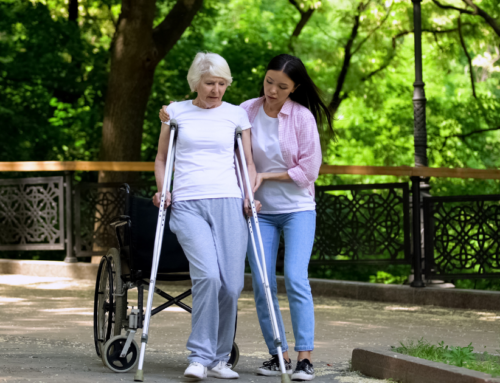How to Identify and Deal With Lewy Body Dementia
Disclaimer: The following is for informational purposes only. New Wave Home Care does not recommend, encourage, or discourage the use of any medication or treatments. For diagnosis and treatment, seek the aid of a qualified medical professional.
Often the most misdiagnosed neurodegenerative disease, Lewy body dementia has only recently come into national awareness due to the untimely passing of Oscar-winning actor and comedian, Robin Williams, and most recently, Bill Buckner, legendary first basemen of the Red Sox (whose dubious distinction was elongating the Sox’ world series losing streak). According to his wife, Buckner battled Lewy body dementia until his death at age 69, whereas Williams, who took his own due to serious depression, wasn’t “diagnosed” with Lewy body dementia until after the fact. He had been diagnosed with Parkinson’s and was treated for motor symptoms instead of the cognitive disorders that accompany Lewy body dementia. Now that Lewy body dementia (LBD) has our attention, it’s important to understand what it is and what the most up-to-date research tells us in terms of diagnosing, living with, and treating Lewy body dementia.
Before we get started, please be aware of the pitfalls of self-diagnosis. If medical professionals have difficulty distinguishing LBD from Alzheimer’s disease up close, it follows that the best you can expect from articles such as this one is to understand what LBD is, what manifestations to look for, and above all, to try to find a balance between awareness and alarmism.
That said, you may find yourself or observe others experiencing some of what you may read in symptom lists, but that doesn’t mean that what you identify in your self-diagnostics is a product of Lewy bodies, especially in light of the fact that diagnostic tools such as the DSM-5* (used in psychoanalysis) caution that symptoms will span a range from normal behavior to extreme psychosis, and therefore don’t automatically imply an illness. For example, depression is a symptom of Lewy body dementia, but it’s also a product of what the German’s call “weltschmerz,” which is depression based on the difference between your life as it is and how you imagined it would be. However, when severe depression occurs, not just to those who appear to live charmed lives like Mr. Williams, but in excess of weltschmerz, something physiological might be at play, and perhaps a visit to the clinic is in order. At the end of the day, a little vigilance can’t hurt.
*DSM-5: The Diagnostic and Statistical Manual of Mental Disorders
What is Lewy Body Dementia?
Lewy body dementia, also known as dementia with Lewy bodies, is the second most common type of progressive dementia after Alzheimer’s disease. A “dementia” is defined as a change in abilities that is more than what would be expected just from the normal aging process, e.g.: changes in thinking, memory, and abilities that impact your ability to manage day-to-day activities.
Discovered by neurologist, Dr. Frederic Henry Lewy, Lewy bodies are misfolded* protein deposits that develop in nerve cells in the brain regions involved in thinking, memory, and movement (motor control). Lewy bodies are found in individuals with several different disorders including Parkinson’s disease and Alzheimer’s disease, hence, the frequent misdiagnosis of dementia with Lewy bodies.
*Misfolded: Due to mutation, thermodynamics, and external factors as we age, proteins fold into an incorrect three-dimensional shape that is typically nonfunctional, causing degenerative diseases.
LBD Signs and Symptoms
One of the first symptoms people may experience is visual hallucinations, which may include seeing people that aren’t there, as well as animals or shapes. Auditory (sound), olfactory (smell), or tactile (touch) hallucinations are also possible. Other early symptoms of LDB are Parkinson’s-like, such as slowed movement, rigid muscles, tremor, and shuffling walk. Since the part of the nervous system that regulates blood pressure, pulse, sweating, and the digestive process is often affected by Lewy bodies, additional physical symptoms can include dizziness, falling, and bowel issues, such as constipation.
Other indicators of LBD are fluctuations in abilities. You may experience cognitive (thinking) problems similar to those of Alzheimer’s disease, such as confusion, poor attention, visual-spatial problems, and memory loss. Fluctuating attention, such as episodes of drowsiness, long periods of staring into space, long naps during the day, or disorganized speech are possible. Sometimes confusion and memory loss can be intermittent. For example, forgetting how to operate a microwave and later remembering. (This can be frustrating for both patients and family members, who may not understand what’s happening.)
One of the earliest signs of LBD is REM (rapid eye movement) sleep behavior disorder. Instead of the normal paralysis that accompanies dreams, patients start physically acting out their dreams. However, not everybody who acts out their dreams has LBD. Other symptoms that may be indicative of Lewy body dementia include apathy, loss of motivation, and severe depression.
While these symptoms sound quite dramatic and easy to spot, it’s important to understand that Lewy body dementia can affect you long before you know that any changes are occurring. Researchers now know that you can reach a threshold of nerve damage before you will see a change in normal functioning.
Complications
Lewy body dementia is progressive. Symptoms worsen, causing severe dementia; aggressive behavior; depression; increased risk of falling and injury; worsening of motor symptoms associated with Parkinson’s disease, such as tremors; and ultimately death on average about eight years after symptoms start.
Who is at risk?
Those at greater risk of developing Lewy body dementia include people older than 60, men more than women, and those who have a family member with Lewy body dementia or Parkinson’s disease.
In part 2 of this article, we’ll discuss the current state and focus of medical research, early detection, treatment, and medication for Lewy body dementia.



